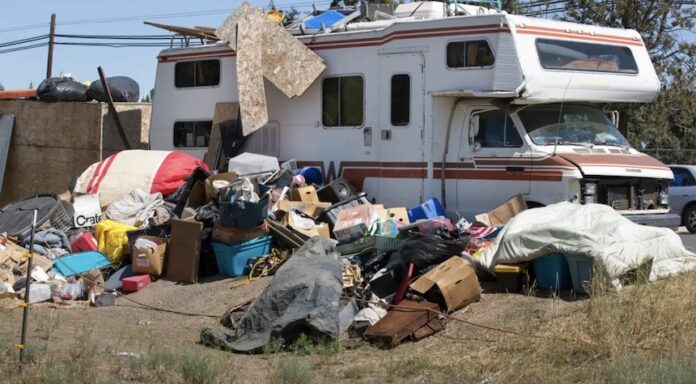A homeless advocate in Oregon is raising the alarm over a bill that has been proposed in his state to decriminalize sleeping in public places.
House Bill 3501, also known as the “Right to Rest Act,” allows “persons experiencing homeless” to “use the public spaces the same way as anyone else without discrimination on the basis of their housing status.”
Kevin Dahlgreen said that the bill was “madness” on “Jesse Watters primetime.”
“Explain how this will end the humanitarian crisis.” “This is backward-thinking,” he said. This is the type of thinking that led us to this mess. “No, I’m not okay with this.”
HB 3501, sponsored jointly by Democratic State Reps. Farrah Chichi and Khanh Pham state that homeless persons should have a right to privacy on any property they own, even if it is in a public place.
The bill defines a public space as any property owned by the state or local government in full or part or that has an easement to be used for public purposes and is open to all. The bill clarifies that a public space is not a private establishment.
Dahlgreen said that decriminalizing homeless people would “open floodgates” to more people coming to the state.
People come to these cities, because they have progressive policies, regardless. “If we do this, Portland’s homeless population will explode. That is not okay,” he said to guest host Pete Hegseth.
He added that the state must adopt an “outreach approach” to bring the crisis under control. He said that it would serve two functions: to build trust and to deter negative behavior.
He predicted that if you see established teams out every day in every camp, engaging with them, building trust, and bringing hope back, they will accept your services. “We leave them out there alone and the feeling is almost post-apocalyptic.”
HB 3501 states that it is an “unlawful act” to deny, refuse, limit, or withhold any of the rights below from a homeless person.
According to the text of the bill, if homeless individual believes that their rights were violated in a publicly accessible area, they may file a complaint. They could receive $1,000 or compensatory damages, depending on which is higher.
The bill adds that the homeless can exercise these rights “without fear of harassment, citation, or arrest from law enforcement officers, private or public security personnel, or employees of local government.”
Dahlgreen described the bill in its entirety as “quite frustrating.”
He said: “We have many citizens who are frustrated, and they ask ‘Where are their rights?’ In our community, the homeless are treated in many ways like a protected group.” “Yes, I do have a soft spot for the homeless. I want to solve this crisis because it will benefit the homeless and the whole community. “We have to solve this together.”
On May 4, the bill will be heard in public by the House Committee on Housing and Homelessness.










